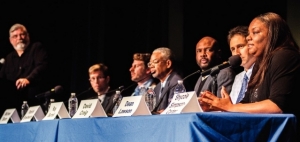King forum held at Wayne Community College
By Phyllis Moore
Published in News on January 20, 2017 9:57 AM

News-Argus/SETH COMBS
Shycole Simpson-Carter, far right, community relations director with the city of Goldsboro, speaks during a panel discussion Thursday on the dreams of the Rev. Dr. Martin Luther King Jr.
"From Here to the Dream," a forum held Thursday at Wayne Community College to provide an open discussion on how we, as a community and country, can move toward accomplishing the Rev. Dr. Martin Luther King Jr.'s dream, drew a capacity crowd and evoked questions from the audience and live-stream viewing audience.
Six panelists laid the foundation for the 90-minute event, expressing their own respective dreams and thoughts on the topic. Following their remarks, the audience was invited to ask their own questions, some opting to do so via text.
Bill Reboli, psychology instructor, served as moderator for the program, organized by the WCC Cultural Diversity/Global Education Task Force.
Andrea Freile, who chaired the task force, announced at the outset that this is the first in a series of discussions on a variety of topics.
The panel was comprised of Michael Bloom, academic skills center coordinator; Patrick Breshears, social studies teacher at Wayne Early/Middle College High School; Ray Burrell, economics instructor at WCC; David Craig, WCC sociology instructor; Dr. Dean Lawson, WCC history instructor; and Shycole Simpson-Carter, community relations director with the city of Goldsboro.
Education took center stage, with Burrell saying his dream early on was to use education to provide the success in today's world.
Growing up on a tobacco farm in this community in the 1960s, it was "the only path out," he said. He spent 24 years in the Air Force and has been at WCC for the past 17.
Craig said when he was invited to be part of the panel, his initial question was whether he'd be speaking as an educator or from the heart. When told "from the heart," he urged the audience to back him up if he got fired.
"Ya'll just know that I was keeping it real," he said, evoking laughter.
He said that King's words in the Aug. 28, 1963, "I Have a Dream" speech are just as valid today, referencing the voter registration laws as one example.
"We don't need strict voter ID laws," he said. "If we want to ensure that voter fraud is not occurring, let us simply put our left thumb print on each ballot. In my view such efficiency should be embraced by those who espouse small government."
Lawson said that there are several things going on today that are especially troubling to him -- police shooting African Americans, voter registration laws, not accepting immigrants and partisanship in voting against someone rather than for them, to name a few.
Ms. Simpson-Carter said she is a firm believer that if we work together, we can achieve anything.
"You'll never do anything on your own," she said. "We can do nothing without each other.
"You're dividing yourself and making it easier for everyone to fail. Together is the only way we can achieve the dream."
Reboli praised the panelists chosen to weigh in and the importance of students being there to hear the message.
"Passed along knowledge is just one part of what we do as instructors and community leaders," he said. "We want to inspire you to be the best that you can, to educate yourselves so that you don't find yourself in situations where you're pigeon-holed."
Audience member Chad Evans asked what some of the challenges are that can be expected for this generation to face.
"Prepare yourself," Burrell said. "Education is only one aspect of that resume you're going to put together.
"Get involved in the community. That's something that Dr. King expressed -- you can all serve."
"Give back to the community," Breshears said. "I think one of the obstacles that youth is going to face is the trappings of the older generation. That's not a slap in the face (to them). But they have a different way of thinking than the youth today. If the youth want to change their world, they have to take charge of their world."
A question received via text asked about the existence of socialism in schools, where "everybody gets a trophy."
"We get nervous by the word socialism," said Breshears, pointing out that the concept is prevalent in public education, by its very inclusive nature.
"I would like to reverse that question," Burrell chimed in. "Why should we be rewarded for not doing anything?"
Ms. Simpson-Carter said that there is fear about telling the truth.
"We're afraid to tell people the truth about their ability," she said. "There's a fear to be honest. I'm not a blunt person. But I do believe when we become more open to the honesty of where we are, then you'll see less of the socialism."
Another text asked, "How do we as students change the local community? Where do you see our community going?"
"Vote," Bloom said. "Vote."
Burrell added that the voter rights act has left a lot of people disenfranchised -- including his 89-year-old mother who never learned to drive and now is faced with having to get a driver's license to prove she is eligible to vote.
Being involved in the community is also important, he added.
"Too many people sit on the sidelines," Burrell said, likening that to being on the bench in a football game. "If you're not in the game, you can't influence the outcome."
Breshears suggested widening the scope of awareness.
"Don't just pay attention to presidential politics or national politics," he said. "The state is moving in a very clear direction.
"Pay attention to state and local politics and question the direction North Carolina is moving and do we want to go along with it."
